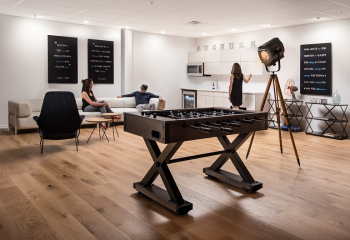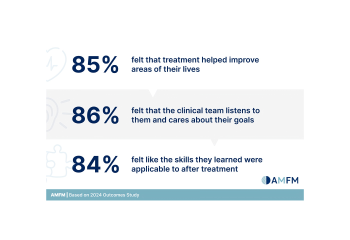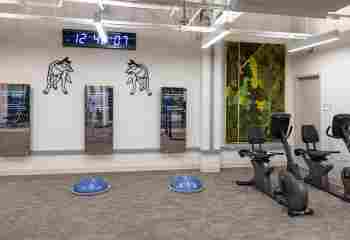More About Rehabs with Motivational Interviewing
Motivational interviewing (MI) is an evidence-based technique used in counseling to motivate people who are experiencing some ambivalence in their desire to change certain behaviors.(1) During motivational interviewing, therapists will typically focus on helping a patient find a personal drive to change by acting as a thought-provoking source of support. Many times this will take the form of a therapist asking open-ended questions or generally acting as an empathetic individual working to help a patient understand the underlying thoughts and emotions driving their behaviors.(2) As such, one may experience motivational interviewing as part of a comprehensive addiction treatment program. Understanding what motivational interviewing is and what to expect from the program can help you navigate addiction treatment and achieve recovery.
What Is Motivational Interviewing?
Motivational interviewing can be helpful for any type of behavior change, but it is often used to help people struggling with substance use disorder (SUD).(3) An essential element of SUD treatment is meeting people where they are and helping them move forward from there. MI is helpful in the early stages of treatment, when people might have conflicting emotions about their need to make significant changes. MI can help people discover their own motivation to align their behaviors with their values.(3) Motivational interviewing works best when there is a true collaboration between the therapist and the patient. A therapist who is genuinely curious about what motivates their patient and who listens without judgment, can help create a safe space where the client feels comfortable expressing their feelings about what they truly want and what is getting in the way.(3) It is the provider’s job to validate the client’s feelings while asking questions that help them find their own autonomy in making changes. During motivational interviewing, the provider will typically ask open-ended questions and affirm and encourage their progress, even if they are not yet where they want to be.(3) Since MI is not a confrontational approach, it can help decrease patient resistance and create a feeling of safety, which is vital to the therapeutic relationship between client and provider.(3)
Does Motivational Interviewing Help in Addiction Treatment?
Motivational interviewing for addiction treatment has proven to be an effective modality and it is rooted in the 5 stages of change: (3)
- Precontemplation: During this stage, the person is not yet considering a change in their behavior. They may even lack the awareness that they need to make any significant changes.
- Contemplation: In the contemplation stage of change, the person is aware they have a problem and may be experiencing some internal conflict yet be somewhat ambivalent about whether or not they are willing to make any changes.
- Preparation: During this stage of change, the person is prepared to take action and begins exploring how to do so.
- Action: During the action stage of change, the person is actively making changes in their patterns, behaviors, and environment. During this stage, there is a genuine level of commitment to change.
- Maintenance: The maintenance stage of change is marked by long-term changes. The focus at this point is relapse prevention. In SUD treatment, one year of sobriety typically characterizes the maintenance stage.
It is important to understand the stages of change because motivational interviewing helps the person struggling and their treatment providers understand where they are in their addiction or recovery process, and where they want to be.(3) People may move back and forth between stages; recovery is rarely linear.
Benefits of Motivational Interviewing for Drug & Alcohol Addiction Recovery
Motivational interviewing is a way to help people develop an understanding of the complexities involved in behavior change, and as such, MI can be beneficial in the treatment of addiction. For those suffering from substance use disorder, MI allows them to feel seen and heard, sometimes for the first time. It is precisely that type of compassionate and empathetic support that creates the space for people to begin to examine their own behaviors and identify the impact of those behaviors on themselves and their loved ones. Understanding one’s maladaptive patterns and behaviors is the first step in disrupting the cycle and enhancing one’s self-efficacy.(3)
Does Insurance Cover Motivational Interviewing in Rehab?
The Affordable Care Act (ACA) changed the landscape of treatment for substance use disorders. The ACA requires health insurance plans to cover treatment for mental health and substance use disorders on par with other medical and surgical procedures.(4) As a result, your insurance may cover some or all of the cost of motivational interviewing if it is part of a medically-necessary addiction treatment plan.(4) Specific plans and coverage will vary, but treatment centers and providers can help verify benefits.
Sources
- Bischof, G., Bischof, A., & Rumpf, H. (Feb. 2021). Motivational interviewing: An evidence-based approach for use in medical practice. Deutsches Arzteblatt International, 118 (7), 109-115.
- American Academy of Family Physicians Foundation. (n.d.). Motivational interviewing: Four steps to get started.
- Substance Abuse and Mental Health Services Administration. (n.d.). Using motivational interviewing in substance use disorder treatment.
- Abraham, A. J., Andrews, C. M., Grogan, C. M., D’Aunno, T., Humphreys, K., Pollack, H. A., & Friedmann, P. D. (2017). The Affordable Care Act transformation of substance use disorder treatment. American Journal of Public Health, 107(1), 31–32. https://doi.org/10.2105/ajph.2016.303558





































































































































